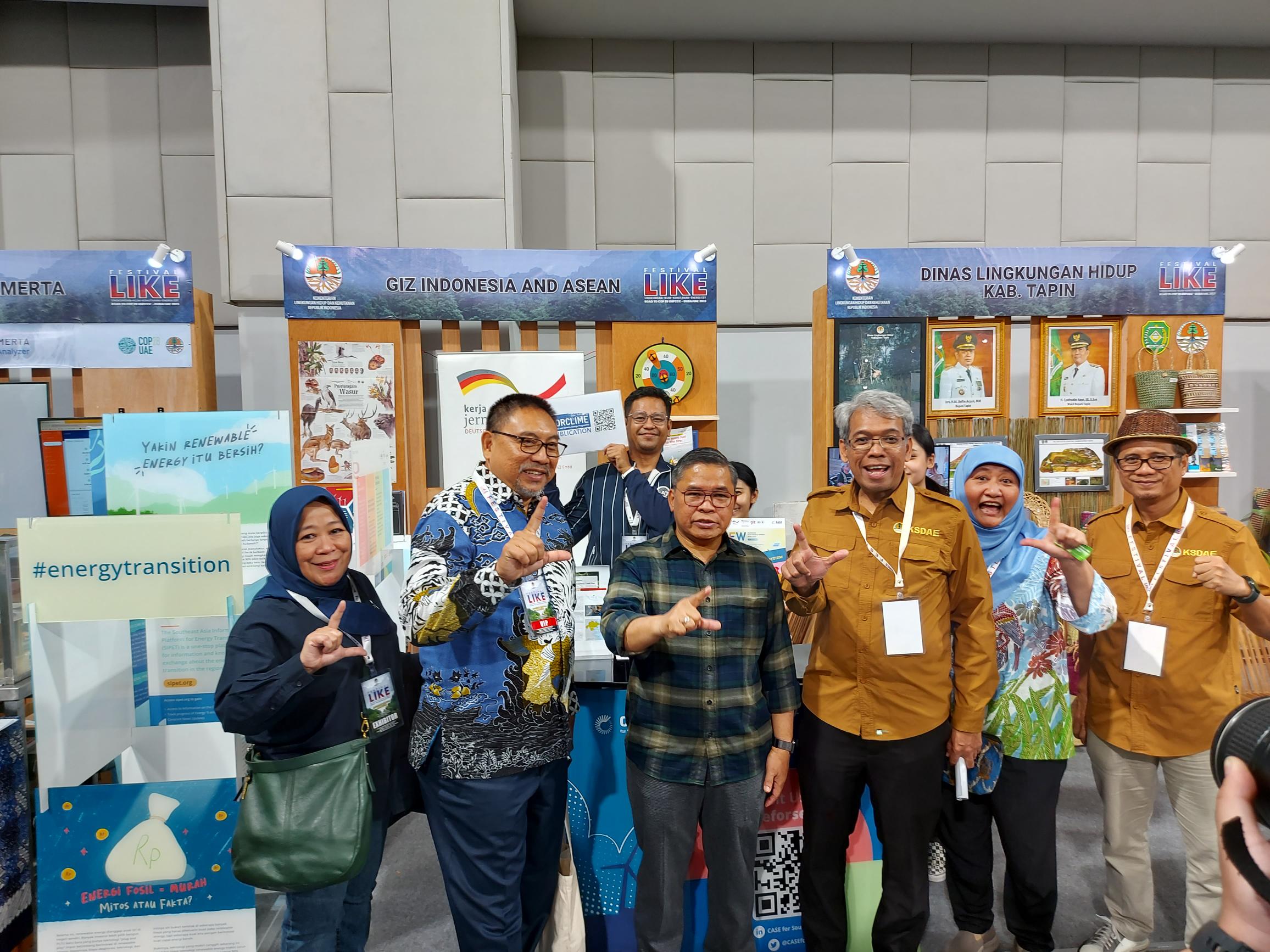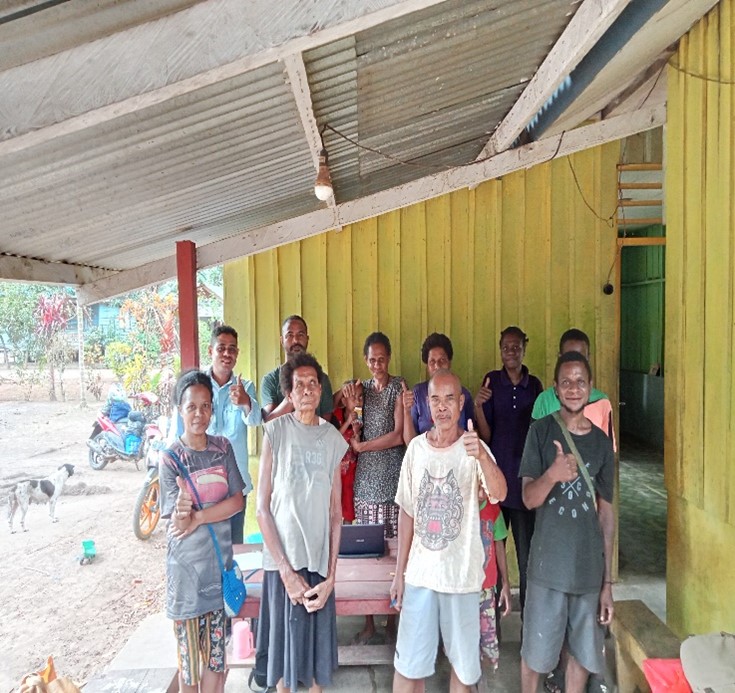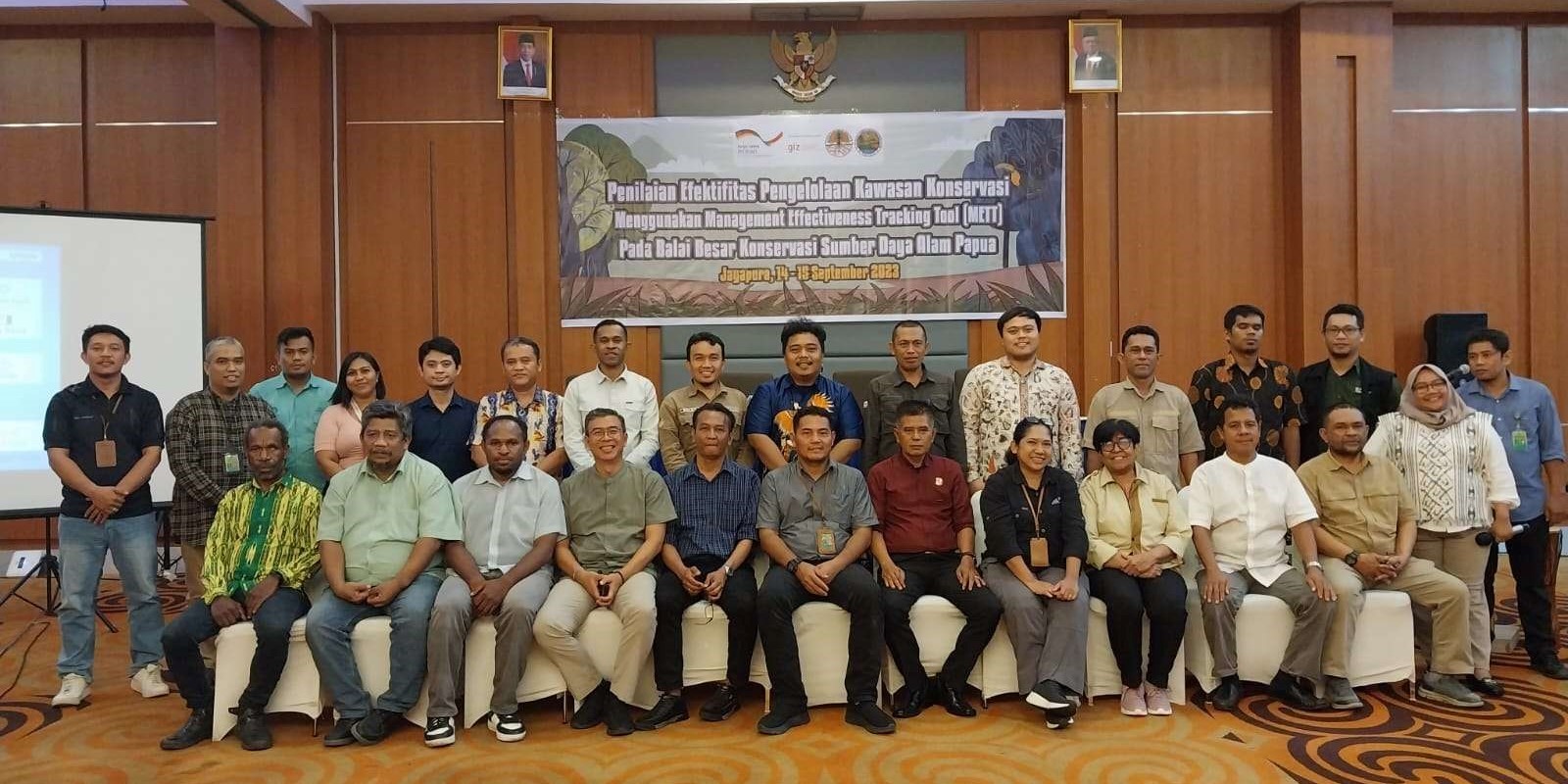FORCLIME
Forests and Climate Change ProgrammeTechnical Cooperation (TC Module)

Select your language

The Ministry of Environment and Forestry (KLHK) held the Environment, Climate, Forestry and New Renewable Energy (LIKE) Festival at the Indonesia Arena, Gelora Bung Karno, Jakarta on 16 - 18 September 2023. This activity was part of the Road to COP 28 UNFCCC series, which will continue in Dubai, UAE at the end of November 2023. Various activities enlivened the LIKE Festival 2023, including exhibitions, demonstrations of innovations, meetings between sellers and buyers, coaching clinics and competitions, as well as various cultural, artistic and musical performances. The LIKE Festival climaxed on 18 September 2023 when President Joko Widodo paid a visit.
FORCLIME, working in conjunction with several GIZ Indonesia and ASEAN projects, specifically: PROPEAT, CASE, CLARITY, SASCI+ and Climate Biodiversity Hub (CLARITY), participated in the exhibition, organizing activities and project achievements that related to the themes of environment, forestry and energy. Indonesia’s Deputy Minister of Environment and Forestry, Mr. Alue Dohong, PhD., had the opportunity to visit the GIZ Indonesia and ASEAN booths, accompanied by the Director General for the Conservation of Natural Resources and Ecosystems, the Functional Official Policy Analyst Senior Adviser and the Director of Conservation Forest Environmental Services Utilization. During his visit, Mr. Dohong made a statement affirming that the activities being carried out by GIZ are supporting the National Medium Term Development Plan (RPJMN), particularly the achievement of KLHK targets, and it is hoped that GIZ will continue to support the Indonesian Government, especially within the fields of environment, climate, forestry and energy.
The website of the Ministry of Environment and Forestry features information on the LIKE Festival and explains that the goal of the festival is to introduce various work actualization and policy corrective steps, as well as to address their implementation within the forestry and environmental sectors in line with the following principles: (1) Community support and encouraging people to become productive through management access to social forests; (2) Increasing environmental restoration efforts through indicators that address deforestation controls, tree-planting efforts and management, and the replication of ecosystems, as well as the protection of conservation areas and wildlife and their ecosystems; (3) Increasing the productivity of the business world in line with national and regional economic growth, developing villages as centers of growth by partnering with the business world and communities in order to balance productivity; (4) Exploring resources in line with the development of New Renewable Energy (EBT); and (5) Utilizing technology in line with productivity, and economic and environmental sustainability efforts through planning, implementation and monitoring via reliable systems.
For further information, please contact:
Pipin Permadi, Senior Adviser for Forest Policy and Strategic Planning and Liaison Officer

Referring to the regulation of the Head of the Human Resources Extension and Development Agency (BP2SDM) of the Ministry of Environment and Forestry P.5/P2SDM/SET/KUM.1/7/2020, basic budget and bylaws (AD/ART) documents are one of the important requirements for institutional assessments of forest farmers’ groups. AD/ART comprise sets of rules that must be drawn up as guidelines for use during the management of an organization. These documents should set out a clear path that can be navigated by forest farmers’ group organizations, while the existence of said documents confirm that a given forest farmers’ group is a complete organization.
Therefore, after identifying the Maroti farmers’ group in Yanggandur Village, one of the villages that is currently being supported by the Wasur National Park and FORCLIME in Merauke Regency, South Papua, Theodorus Tethool S.Sos., a village facilitator, assisted in the process of preparing an AD/ART for the Maroti farmers’ group on 12 – 13 September 2023 in Yanggandur Village.
It is hoped that through this mentoring and guidance process, the community's economy will be stimulated and empowered through the utilization of non-timber forest products. KTH Moruti is a new farmers’ group that has not yet been categorized as Beginner Class. The AD/ART that is currently being drafted will ultimately become a guide for use by the group and, in addition, should become a catalyst for improving the category class of KTH Moruti.
For further information, please contact:
Theodorus Tethool, Yanggandur Village Facilitator
Ruben Yogi, GIS and Mapping Advisor
Rut Ohoiwutun, Community Forest and Customary Forest Advisor

During the management of conservation areas, assessments of management effectiveness represent an important instrument when identifying priorities and resource allocation as a part of attempts to achieve sustainable management goals. The management of conservation areas within Papua Province is the responsibility of the Natural Resources Conservation Center (BBKSDA) in Papua Province, which is the technical implementing unit of the Directorate-General of Natural Resources and Ecosystem Conservation at the Ministry of Environment and Forestry. BBKSDA Papua manages 19 conservation areas of a total area of approximately 4,132,502.71 hectares spread across 24 districts/cities and four provinces, specifically Papua, Central Papua, Central Mountain Papua and South Papua.
In order to assess the effectiveness of conservation area management within its territory, BBKSDA Papua organized an assessment of 10 conservation areas under its administration from 14 - 15 September 2023 in Jayapura, Papua. This follows assessments of nine other conservation areas that were carried out at the end of last year.
The assessment activity for the 10 conservation areas was opened by the Head of the Papua BBKSDA, A.G. Martana, S.Hut., MH., and was attended by 60 participants who were representing related parties. During the assessment, the Director of Conservation Area Management, Jefri Susyafrianto, delivered his speech and directions online.
To assess the effectiveness of conservation area management, the Directorate-General of Natural Resources and Ecosystem Conservation has created the Management Effectiveness Tracking Tool (METT), which is an internationally accepted approach to the monitoring and assessment of the overall management of conservation areas. The METT can help conservation area managers assess how effectively their conservation areas are being managed and what efforts are required in order to maintain and/or improve existing conditions. The assessment will ultimately result in recommendations and action plans that will hopefully increase the overall effectiveness of conservation area management.
For more information, please contact:
Ruben Yogi, Junior Adviser for GIS and Forest Mapping
Mohammad Sidiq, Strategic Area Manager for Sustainable Forest Management and Coordinator for Tanah Papua
 |
Supported By: |
  |